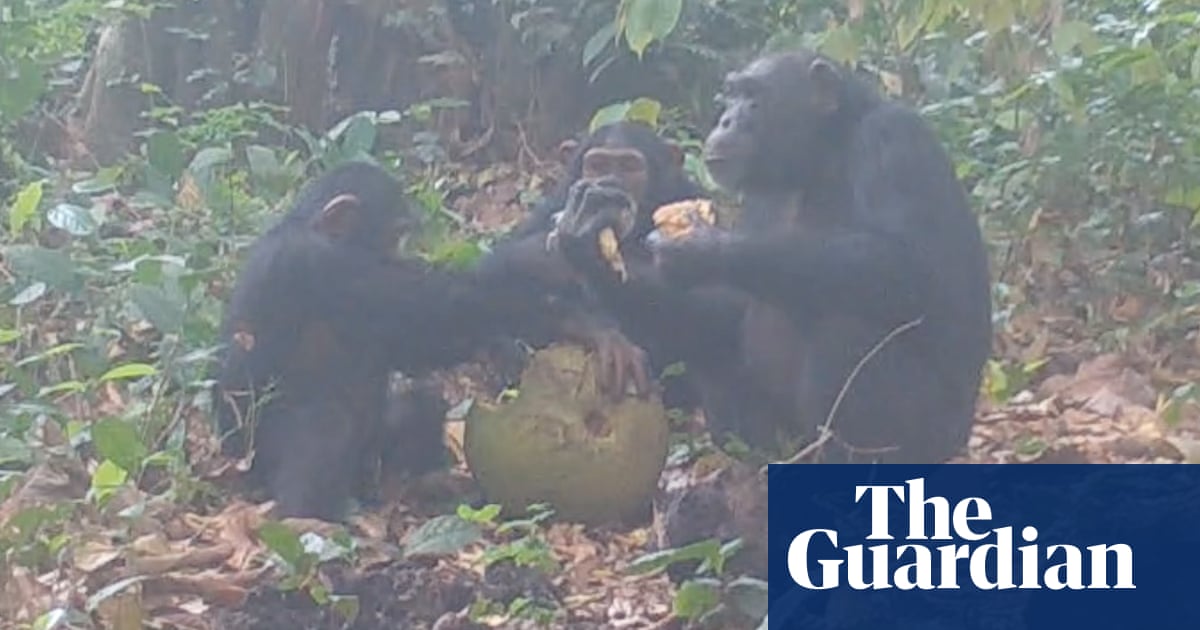
Humans have gathered to feast and enjoy a tipple together for thousands of years, but research suggests chimpanzees may also bond over a boozy treat.
Wild chimpanzees in west Africa have been observed sharing fruit containing alcohol – not in quantities to get roaring drunk but, possibly, enough for a fuzzy beer buzz feeling.
The researchers, led by scientists from the University of Exeter in the UK, caught chimpanzees on film sharing fermented African breadfruit in Guinea-Bissau’s Cantanhez national park.
“For humans, we know that drinking alcohol leads to a release of dopamine and endorphins, and resulting feelings of happiness and relaxation,” said Anna Bowland, from the Centre for Ecology and Conservation at Exeter’s Penryn campus in Cornwall.
“We also know that sharing alcohol, including through traditions such as feasting, helps to form and strengthen social bonds.
“Now we know that wild chimpanzees are eating and sharing ethanolic fruits, the question is: could they be getting similar benefits?”
Using motion-activated cameras, the researchers filmed chimpanzees sharing the large, dense and fibrous fermented fruit on 10 occasions. The fruit shared was tested for alcohol content. The highest level found was the equivalent of 0.61% alcohol by volume (ABV).
“Chimps don’t share food all the time, so this behaviour with fermented fruit might be important,” said Kimberley Hockings, also from the University of Exeter.
Though the alcohol level is relatively low, the chimpanzees ate a lot of fruit every day so might ingest a fair quantity of alcohol, she said. “They can feed on kilograms of the stuff every day. It’s probably analogous to us sipping on a light beer.”
Hockings and her colleagues published a paper in 2015 describing how chimpanzees in west Africa stole and consumed palm sap alcohol created by humans. Some of them appeared to become troublesome, causing mischief such as not letting others build their night nests.
The researchers behind the latest study, however, said chimpanzees were unlikely to get “drunk” on the breadfruit because it would not improve their survival chances.
The sharing seemed to take place between all ages and sexes. Two adult females, nicknamed Chip and Até, were seen ignoring a larger hunk of breadfruit in favour of a smaller but fermented piece.
Two adult males, Mandjambé and Gary, were observed approaching ripe breadfruit with aggressive stances. Mandjambé claimed a piece and began to feed, while another adult male, Bobby, kept Gary at bay. They all had a taste of the ripe breadfruit in the vicinity in the end.
The paper, which appears in the journal Current Biology with the title “Wild chimpanzees share fermented fruits”, asks the question: “Do the origins of feasting behaviour derive from a shared common ancestor?”
Hockings said: “We need to find out more about whether the chimpanzees deliberately seek out ethanolic fruits and how they metabolise it, but this behaviour could be the early evolutionary stages of feasting. If so, it suggests the human tradition of feasting may have its origins deep in our evolutionary history.”
She said the number of observations was small but they could lead to “an explosion” of research into the topic.
Source: theguardian.com


















